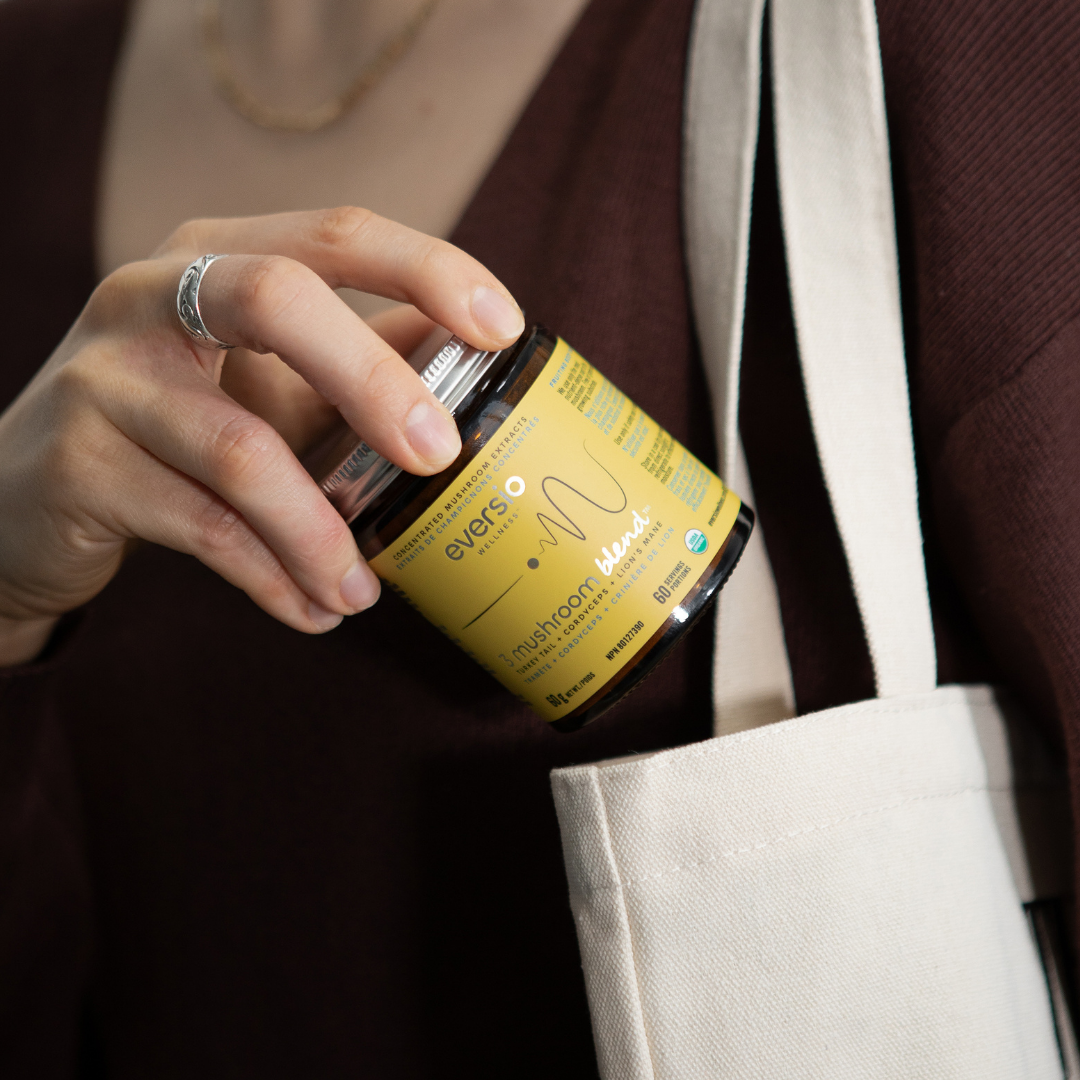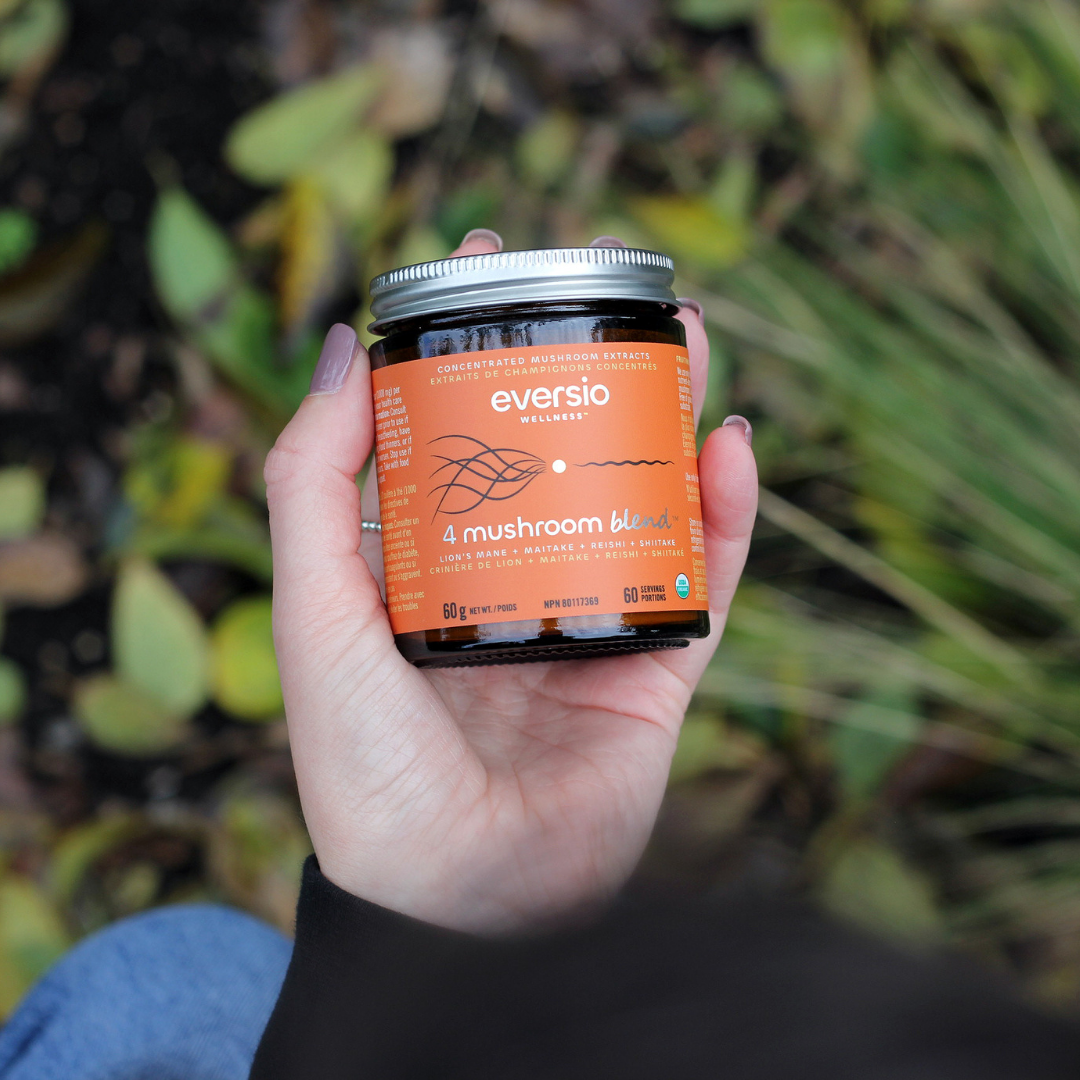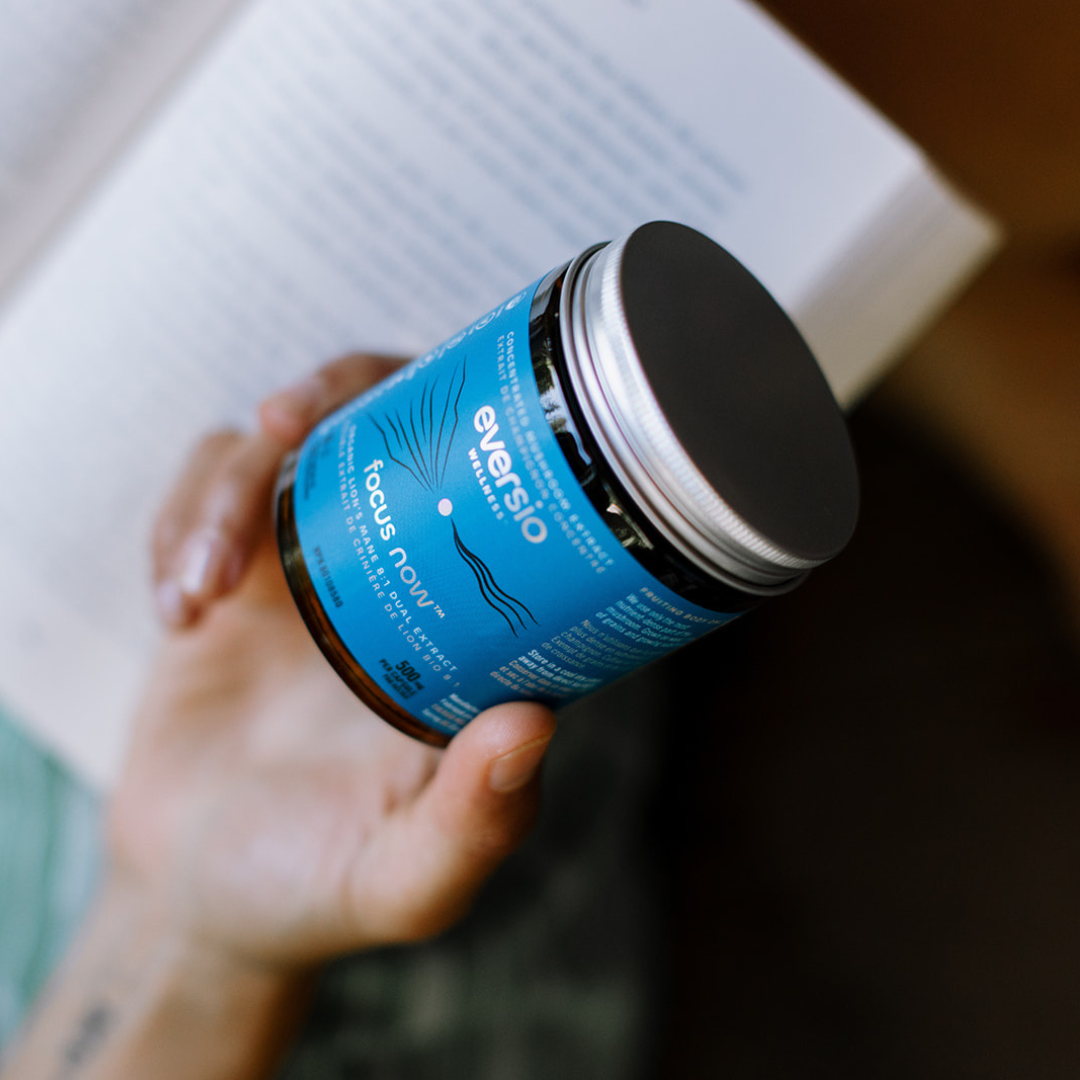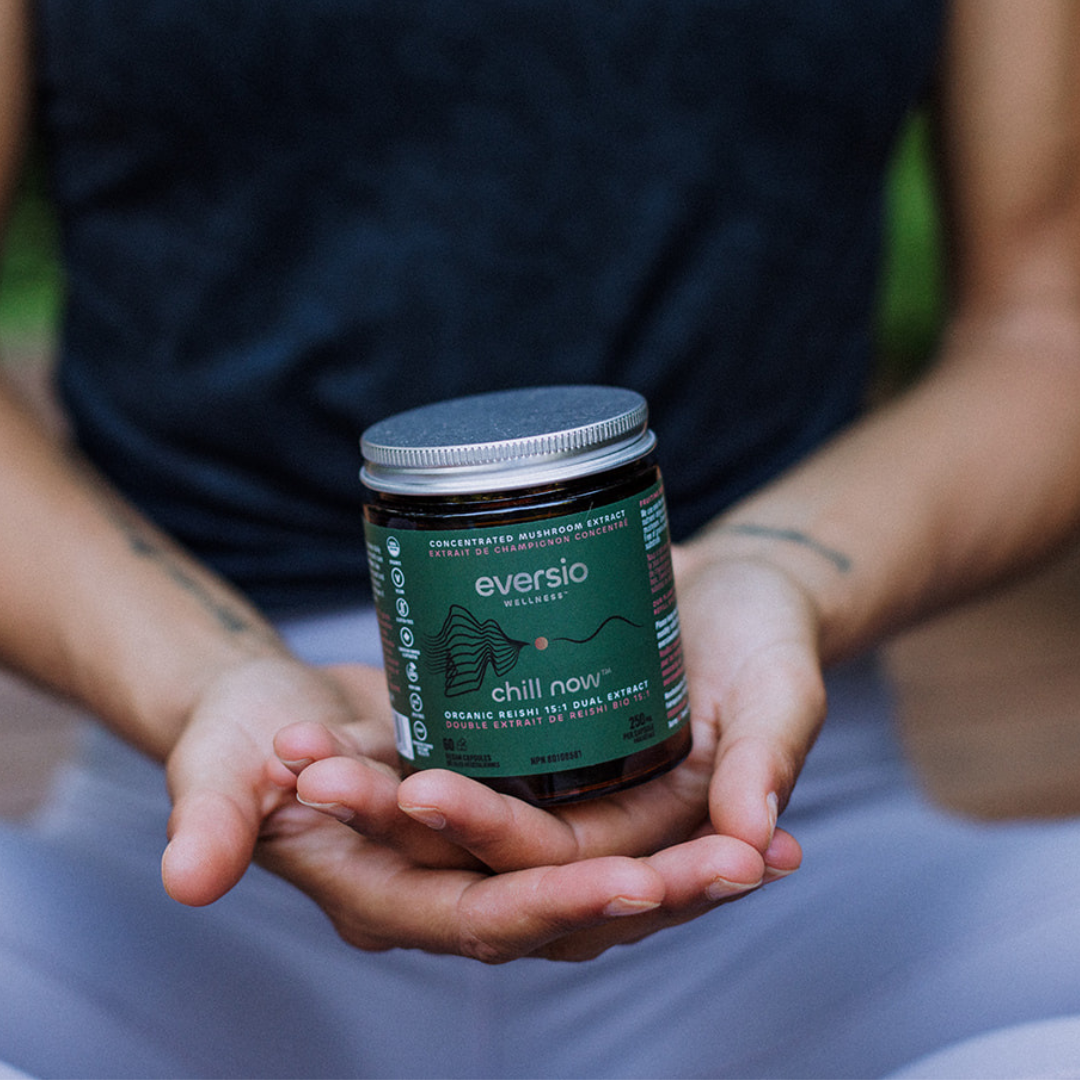Maitake Magic: The Dancing Mushroom for Metabolic Health, Hormones & Immune Resilience
Meet Maitake: Hen of the Woods, “Dancing” with History
Summer 2025 has already been magical, and it's about to get better as we prepare to launch two new Eversio Wellness mushroom extract products! We've already talked about 5MB (five mushroom blend) on episode 25 of the podcast, and in this episode we're introducing you to premuim, organic, maitake capsules! Let's go!
Maitake (Latin: Grifola frondosa) goes by many names. For foragers it’s hen of the woods, a frilly rosette that fans out like feathers at the base of hardwoods.

In Japan it’s the “dancing mushroom,” a nod to the joy of finding such a prized food/medicine in the wild. Centuries of traditional use have now met modern lab coats: maitake contains dozens of bioactive compounds, with the headline act often being beta-D-glucans—the polysaccharides best known for immune modulation.
Closer to home, you can spot maitake on chef-driven menus across Vancouver (the “Kentucky-fried” maitake moment is real). Culinary love aside, our focus at Eversio is mycotherapy—using well-cultivated, well-extracted mushrooms to support health in ways that are safe, transparent, and measurable.
Cultivation matters. We source outdoor, hardwood-grown fruiting bodies (oak, like in nature), then use hot-water extraction. No myceliated grain, no fillers. If you want the benefits research talks about, start with the same part of the mushroom and the same extraction used in that research.
Why We’re Launching a Maitake Capsule (and Why Dose Matters)
We’re launching maitake because you asked for it—through reviews, emails, DMs, and real conversations about your top concerns: metabolic health, hormone balance, and immune support. On the science side, maitake kept resurfacing across clinical and preclinical research for exactly those targets. So we built a capsule that’s potent, clean, and stackable with the Eversio blends you already love.
Our formula at a glance:
Whole fruiting body only
8:1 hot-water extract
400 mg per capsule (= ~3,200 mg quantity crude equivalent)
40% beta-D-glucans (third-party tested)
USDA Organic Certified
NPN (Health Canada licensed)
Grown outdoors on hardwood
No grain fillers
Why 400 mg?
Because it lets you take 1–2 capsules and still add your 4 Mushroom Blend or 5 Mushroom Blend without exceeding Health Canada’s max of 7,000 mg/day dried-equivalent for maitake. Two caps land you at ~6,400 mg—a big therapeutic window with room for your blends.
Label note: You’ll see “consult a health-care practitioner if you have diabetes or use diabetes meds.” Maitake can influence blood sugar management; your practitioner can help you dose safely.
Immune Modulation: Training, Not Overdriving
Maitake’s beta-glucans are renowned for immune modulation—supporting macrophages and natural killer (NK) cells so your defenses respond appropriately (not too little, not too much). In parts of Asia, maitake extracts have been used adjunctively alongside conventional therapies to support immune parameters. That doesn’t make maitake a treatment or cure; it does make it a compelling daily tool for resilience, especially during high-stress seasons or recovery windows.
Signs immune modulation may matter for you:
You cycle between catching “everything” and feeling inflamed by “everything.”
You’re seeking steady-state wellness support rather than a sick-day quick fix.
You want a non-stimulating aid you can take long-term.
Metabolic Health: Blood Sugar, Cravings & Steady Energy
If we had to pick one headline for maitake, it would be metabolic support. In discussions on the show, Dr. Des walks through how maitake can improve insulin sensitivity and enhance peripheral glucose transport—helping your tissues pull glucose out of your blood and into your cells more effectively. Translation: fewer dramatic spikes and crashes, steadier energy, and fewer “hangry” moments.
Mechanistically, maitake has also been explored for alpha-glucosidase inhibition, a fancy way of saying it can slow the breakdown and absorption of starchy carbohydrates (think: bread, rice, potatoes). When carb absorption is smoother, post-meal blood sugar rises more slowly, and your body gets a fighting chance to keep levels in range.
Practical tips to pair with maitake:
Post-meal movement: 10–20 minutes of easy walking after you eat can meaningfully blunt glucose spikes. It doesn’t have to be a sweat session—slow and consistent wins here.
Protein + fat ballast: If you’re having carbs, pair them with protein and healthy fats to slow the glycemic rise.
Consistency: As Brandi shares, mushrooms are not “one-and-done.” Take them daily and give your biology a few weeks to show the difference (and check in with labs when appropriate).
Cholesterol & Liver Health: Another Metabolic Lens
We also touch on experimental findings (including animal data) showing maitake’s potential to lower triglycerides and cholesterol and to support healthy liver metrics. A key thread here: metabolic health is systemic. If blood sugar is steadier, your liver workload often lightens. If your liver clears cholesterol efficiently (yes, via bile and fecal excretion), your lipids look better on paper and you often feel better in life.
If you’re statin-curious-but-hesitant: Talk with your clinician about lifestyle + mushroom strategies and how to monitor progress. Some people are great candidates for pharmaceuticals; others can make big headway naturally. Most of us live somewhere in the middle, with both tools on the table.
And for the cooks: oyster mushrooms plus maitake is a delicious duo for lipid love. While oyster isn’t recognized as “medicinal” for Canadian capsule licensing, eating it regularly is fair game—and tasty.
Women’s Hormones: Perimenopause, PCOS, Fertility & Beyond
A big reason our community pushed maitake to the top: women’s health. From perimenopause to post-menopause, from PMS to PCOS, blood sugar stability is a hormone story. When insulin is out of balance, cortisol and sex hormones get nudged off-course, too.
PCOS & ovulation support
In small clinical work, maitake extracts have been associated with higher ovulation rates in women with PCOS, including as an adjunct to clomiphene citrate (a common ovulation-inducing med). There are also mechanistic hints that maitake may support aromatization—helping shift excess androgens toward a more balanced estrogen:androgen ratio. That’s relevant whether you’re actively trying to conceive or simply want a more predictable, comfortable cycle.
Stress resilience (adaptogenic vibes)
While “adaptogen” isn’t a regulated medical term, many people experience maitake as grounding. When stress physiology calms, hormones and glucose tend to self-organize better. Think of maitake as part of a nervous-system-friendly routine: light morning sunlight, protein-forward breakfast, breathwork or prayer, gentle movement, and mushrooms that support the system rather than whip it.
Ovulation is a vital sign. Even if you’re not trying to get pregnant, cycling regularly (with minimal symptom “storms”) is a sign your whole system is trending healthier.
Ergothioneine: The “Longevity Vitamin” You’re Probably Not Getting Enough Of
We’re nerds for ergothioneine, a unique antioxidant concentrated in mushrooms (including maitake). Humans can’t make it; we must get it from food. It tends to accumulate in mitochondria-dense tissues—brain, heart, liver, reproductive organs—where it helps buffer oxidative stress and support cellular energy.
As research and testing methods advance, expect to hear more about ergo in the same breath as other foundational nutrients. For now, the practical advice is simple: eat mushrooms and/or use well-extracted fruiting-body products consistently.
How to Choose a Maitake That Actually Works
The mushroom aisle is crowded.
Here’s how to keep it simple and science-aligned:
Fruiting body over myceliated grain. Most human-relevant data is on the fruiting body. Grain-grown mycelium can dilute active compounds and muddy beta-glucan testing.
Hot-water extraction. Beta-glucans are water-soluble. Hot-water extraction gets you what you came for.
Beta-glucans on the COA. Look for quantified beta-D-glucans (not just total polysaccharides, which can be inflated by starch).
Wood-grown, outdoors if possible. “Di Dao” style cultivation—grown where it grows—produces a richer profile that mirrors what traditional use is based on.
Third-party testing & transparency. You should be able to see COAs for safety (heavy metals, microbials, aflatoxins) and efficacy (beta-glucans, signature actives when applicable).
Regulatory fit. In Canada, look for NPN licensing and USDA Organic where relevant.
At Eversio, our maitake capsule checks each box—because the details are the difference between “mushroomy marketing” and meaningful results.
How to Use Maitake (and How to Stack with Your Blends)
Dosing (Adults)
1 capsule daily with food or beverage (≈ 3,200 mg dried-equivalent)
Up to 2 capsules daily (≈ 6,400 mg dried-equivalent)
Do not exceed a total maitake intake of 7,000 mg/day dried-equivalent from all sources (capsules + blends).
Stacking examples
Morning metabolism focus:
Coffee/tea + 5 Mushroom Blend
+ 1 Maitake capsule
Post-breakfast walk (10–20 min)
Evening immune & sleep-friendly routine:
Cozy cocoa + 4 Mushroom Blend (Maitake • Shiitake • Reishi • Lion’s Mane)
+ 1 Maitake capsule
Light stretching, screens off, gratitude journal
Training day:
Pre-workout protein + 2 Maitake capsules
Carb-aware meal after
Walk it off; reishi and magnesium at night for wind-down
Special note for pregnancy & breastfeeding
Maitake does not carry specific cautions in common references, but our guidance remains conservative: consult your practitioner to personalize use, especially if you have unique medical considerations.
Diabetes & medication interactions
Because maitake may support insulin sensitivity and post-meal glucose control, anyone on diabetes medications should speak with their clinician about dose timing and monitoring. It’s a great conversation to have; bring your glucometer or CGM data and experiment responsibly.
Real-World Momentum: From Community → Research → Capsule
This capsule took us a year to build right: deep literature reviews, internal debates at the “team table,” and collaboration with our naturopathic doctors to align with Health Canada, FDA, and USDA Organic frameworks. We went back to first principles—What does the science support? What does our community need? How do we deliver both transparently?—and came out with a product that’s big on dose, clean in design, and easy to live with.
Quick Guide: Who Maitake May Help (At a Glance)
- People who feel crashy after carb-heavy meals
- Those working on A1C, fasting glucose, or insulin goals
- Women navigating perimenopause, PCOS, fertility, or post-menopause
- Anyone wanting immune balance without a jittery “immune boost”
- Folks addressing cholesterol and liver health within a lifestyle plan
- Mushroom lovers who want ergothioneine in the mix—daily
Maitake FAQs
Is maitake safe to take daily?
Generally, yes—maitake is used as a food and is well-tolerated as an extract. We recommend 1–2 capsules daily with food. If you have diabetes or take diabetes meds, consult your practitioner first.
Can I take maitake with other Eversio products?
Yes. We formulated 400 mg/cap (8:1) so you can stack with 4 Mushroom Blend or 5 Mushroom Blend without overshooting 7,000 mg/day dried-equivalent.
Will I feel it right away?
Some people notice steadier energy and fewer cravings within days. For labs (A1C, lipids), think weeks to months. Consistency > intensity.
Is this the same as “D-fraction” I’ve seen online?
No. D-fraction is a highly isolated proprietary extract often sold as a pharmaceutical-grade product. We use a full-spectrum fruiting-body hot-water extract to deliver the mushroom’s natural matrix—potent, affordable, and stackable for daily life.
Can I just eat maitake instead of taking a capsule?
We love that for you. Eat mushrooms often and use extracts for precision and consistency, especially when you’re targeting specific outcomes.























Leave a comment
All comments are moderated before being published.
This site is protected by hCaptcha and the hCaptcha Privacy Policy and Terms of Service apply.